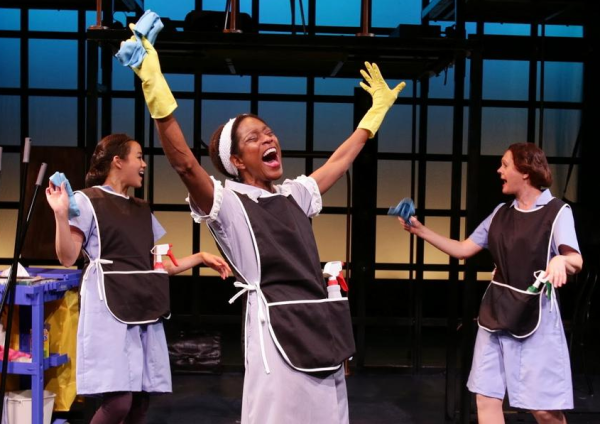Working

(© Mark S. Howard)
There are dull jobs and, as it turns out, there are dull shows about jobs. The Lyric Stage Company of Boston is currently mounting a lackluster production of the 2011 rewrite of the 1977 musical adapted by Stephen Schwartz and Nina Faso from Studs Terkel’s landmark 1974 oral history, Working: People Talk About What They Do All Day and How They Feel About What They Do. The book, of course, was important, but it bears remembering that the now chipper, now poignant revue based on it lasted only 24 performances on Broadway in 1978 — and that despite a cast that included Joe Mantegna and Patti LuPone!
This new version, with “additional contributions” by Gordon Greenberg (who also directed the first production), premiered on Terkel’s home turf of Chicago and hauls the work into the 21st century. In addition to consolidating characters (most of them based on Terkel’s interviews with America’s largely invisible work force), it inserts a few less noble types, including a hedge-fund manager, and adds a couple of tunes by Lin-Manuel Miranda, Tony-winning composer-lyricist of In the Heights, to the already-eclectic original score by Schwartz, Craig Carnelia, Micki Grant, Mary Rodgers with Susan Birkenhead, and James Taylor.
Author, historian, and radio personality Terkel was neither judgmental nor sentimental — though both qualities seep into the musical sprung from his work. Clearly we are meant to decry the hedge-fund guy, with his assertion that money management is an aphrodisiac, and champion the insufficiently thanked laborers who make our world go round. But Working tends to demean its subjects’ individual contributions with the generic perkiness of Schwartz’s Walt Whitman-inspired show opener, “All the Livelong Day,” or bemoan their monotonous if necessary labors in such numbers as Carnelia’s “Just a Housewife” and Grant’s “Cleanin’ Women” — in which a third-generation domestic hopes the low buck will stop with her and that her daughter will have a life of less drudgery. There follows a mirror number, Schwartz’s “Fathers and Sons,” in which a laborer expresses the desire to push his son to higher aspirations than his father did him.
The idea that every worker wants “Something to Point To” (the upbeat Carnelia song that ends the show) as evidence of his or her contribution to a larger whole, rather than to labor anonymously, is both rousing and endorsable. But though there is a nod to outsourcing in the new version of the show, it doesn’t really take on that bogeyman of uninspiring employment, unemployment (admittedly less an issue in the 1970s than today). Still, there are keen moments, both in the show and in director/choreographer Ilyse Robbins’ production for the Lyric. Tiffany Chen brings understated poignancy and a sweet soprano to Taylor’s “Millwork,” which brings home the strenuousness, danger, and especially the monotony of its subject. In Grant’s “The Mason,” Cheeyang Ng impishly conveys the passion of the number’s title character for his work and its durability. And the vocally strong Christopher Chew, looking smart in his tool apron and safety straps, makes an aptly Marlborough-Mannish ironworker (though his doddering rendition of bored retiree “Joe,” in Carnelia’s song of the same name, is clichéd). Robbins moves the characters around Anne Sherer’s scaffolding set capably enough, but her choreography, usually more imaginative than it is here, is insufficiently energetic.
Though the transitions are smooth, there is little coherence to compel the revue, and the cornucopia of composers doesn’t help in that department. Moreover, at the Lyric, the six performers are neither outstanding singers nor chameleonic distinguishers among characters — which counteracts the thematic notion that each worker is a distinct individual with distinct dreams rather than a cog in the American production machine. Between material and performance, it all adds up to a perfect storm of mediocrity. Ironically, for a show about getting the job done, this one just doesn’t.











